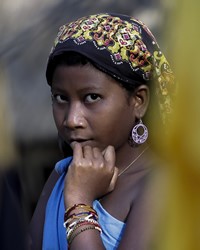Bateq in Malaysia

Photo Source:
Copyrighted © 2026
Hafiz Johari - Shutterstock All rights reserved. Used with permission |
Send Joshua Project a map of this people group.
|
| People Name: | Bateq |
| Country: | Malaysia |
| 10/40 Window: | Yes |
| Population: | 1,400 |
| World Population: | 1,400 |
| Primary Language: | Batek |
| Primary Religion: | Ethnic Religions |
| Christian Adherents: | 3.00 % |
| Evangelicals: | 0.50 % |
| Scripture: | Portions |
| Ministry Resources: | No |
| Jesus Film: | Yes |
| Audio Recordings: | No |
| People Cluster: | West Malaysia Indigenous |
| Affinity Bloc: | Malay Peoples |
| Progress Level: |
|
Introduction / History
The Bateq (also spelled Batiq or Batek) are one of the nineteen Orang Asli people groups of Peninsular Malaysia. They are part of the Semang (officially called Negrito) subgroup. When asked who they are, Bateq is what they will usually answer. The Bateq ("people of our group") are a people with little accounting of their history. They are nomadic foraging people who have a very low literacy rate and almost no formal tradition of storytelling.
Their settlements are located in the Kuala Krai district of Kelantan, the Besut district of Terengganu, and the Jerantut and Kuala Lipis districts of Pahang.
What Are Their Lives Like?
Traditionally, the Bateq lived in the rain forest in small, nomadic groups. They survive on a combination of hunting and gathering wild foods and trading forest products such as rattan and resinous wood for food, tobacco, and manufactured goods. Surrounded by a household of plastic ware and steel containers, the Bateq of today are no longer the loincloth-clad people of years gone by. The men's loincloths of pounded bark have given way to shirts and shorts or sarongs, and sometimes long trousers. Blouses and sarongs have replaced the women's short kilt and strands of fungus which were made from a waist-string of the same material.
Much of the Bateq's traditionally occupied jungle homeland in Kelantan has been destroyed either by unchecked development of logging activities or logging by the Federal and State governments. The alternative location provided for the Batek is a thousand-acre patch of land surrounding Post Lebir, a government-sponsored settlement on the Middle Lebir River.
The vast majority of the Bateq have fled into the nearby National Park (Taman Negara), which straddles the Kelantan-Pahang border. Some settled along the northern border of the National Park and others withdrew into the interior of the park to continue their traditional way of life by foraging and trading. Still others have joined the Bateq living near the park in Pahang where they make their living by trade and wage labor.
Many Bateq remain nomadic. Moving between three villages every six months, crops (like tapioca, yams, and groundnuts) are cultivated, harvested and replanted. Tending to crops is the job of women; the men hunt mouse deer, monkeys, gibbons, birds, and harvest bamboo.
What Are Their Beliefs?
Most of the Bateq who have settled down in permanent villages have converted to Islam. Generally, Bateq are animists who shun their own people who have converted to Islam. Nevertheless, the worldview of the Bateq is still gripped by animistic beliefs. Some still follow their traditional religion, a complex set of beliefs and practices that connect them to their environment and fellow Bateq through relations with a group of deities that are associated with forces of nature (such as thunder god).
What Are Their Needs?
Much of the Bateq's jungle homeland has been destroyed by unchecked development and logging activities. Pray that God will provide adequate resources to meet their physical needs. Pray for believers who live near Bateq villages to relate and respond to the needs of the Bateq.
Prayer Points
Pray for spiritual discernment and a hunger for truth.
Pray for a willingness to give all for the Lord of lords.
Pray for workers.
Pray for disciples who will disciple their families.